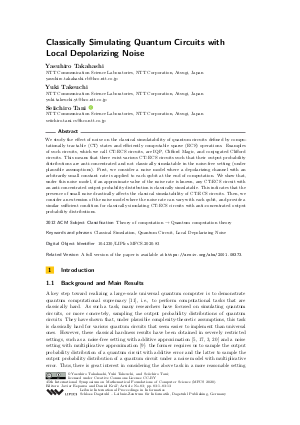Classically Simulating Quantum Circuits with Local Depolarizing Noise
Authors
Yasuhiro Takahashi,
Yuki Takeuchi,
Seiichiro Tani 
-
Part of:
Volume:
45th International Symposium on Mathematical Foundations of Computer Science (MFCS 2020)
Part of: Series: Leibniz International Proceedings in Informatics (LIPIcs)
Part of: Conference: Mathematical Foundations of Computer Science (MFCS) - License:
 Creative Commons Attribution 3.0 Unported license
Creative Commons Attribution 3.0 Unported license
- Publication Date: 2020-08-18
File

PDF
LIPIcs.MFCS.2020.83.pdf
- Filesize: 0.58 MB
- 13 pages
Document Identifiers
Related Versions
-
A full version of the paper is available at https://arxiv.org/abs/2001.08373.
Subject Classification
ACM Subject Classification
- Theory of computation → Quantum computation theory
Keywords
- Classical Simulation
- Quantum Circuit
- Local Depolarizing Noise
Metrics
- Access Statistics
-
Total Accesses (updated on a weekly basis)
0Document
0Metadata
Abstract
We study the effect of noise on the classical simulatability of quantum circuits defined by computationally tractable (CT) states and efficiently computable sparse (ECS) operations. Examples of such circuits, which we call CT-ECS circuits, are IQP, Clifford Magic, and conjugated Clifford circuits. This means that there exist various CT-ECS circuits such that their output probability distributions are anti-concentrated and not classically simulatable in the noise-free setting (under plausible assumptions). First, we consider a noise model where a depolarizing channel with an arbitrarily small constant rate is applied to each qubit at the end of computation. We show that, under this noise model, if an approximate value of the noise rate is known, any CT-ECS circuit with an anti-concentrated output probability distribution is classically simulatable. This indicates that the presence of small noise drastically affects the classical simulatability of CT-ECS circuits. Then, we consider an extension of the noise model where the noise rate can vary with each qubit, and provide a similar sufficient condition for classically simulating CT-ECS circuits with anti-concentrated output probability distributions.
Cite As Get BibTex
Yasuhiro Takahashi, Yuki Takeuchi, and Seiichiro Tani. Classically Simulating Quantum Circuits with Local Depolarizing Noise. In 45th International Symposium on Mathematical Foundations of Computer Science (MFCS 2020). Leibniz International Proceedings in Informatics (LIPIcs), Volume 170, pp. 83:1-83:13, Schloss Dagstuhl – Leibniz-Zentrum für Informatik (2020)
https://doi.org/10.4230/LIPIcs.MFCS.2020.83
BibTex
@InProceedings{takahashi_et_al:LIPIcs.MFCS.2020.83,
author = {Takahashi, Yasuhiro and Takeuchi, Yuki and Tani, Seiichiro},
title = {{Classically Simulating Quantum Circuits with Local Depolarizing Noise}},
booktitle = {45th International Symposium on Mathematical Foundations of Computer Science (MFCS 2020)},
pages = {83:1--83:13},
series = {Leibniz International Proceedings in Informatics (LIPIcs)},
ISBN = {978-3-95977-159-7},
ISSN = {1868-8969},
year = {2020},
volume = {170},
editor = {Esparza, Javier and Kr\'{a}l', Daniel},
publisher = {Schloss Dagstuhl -- Leibniz-Zentrum f{\"u}r Informatik},
address = {Dagstuhl, Germany},
URL = {https://drops.dagstuhl.de/entities/document/10.4230/LIPIcs.MFCS.2020.83},
URN = {urn:nbn:de:0030-drops-127533},
doi = {10.4230/LIPIcs.MFCS.2020.83},
annote = {Keywords: Classical Simulation, Quantum Circuit, Local Depolarizing Noise}
}
Author Details
References
-
S. Aaronson and A. Arkhipov. The computational complexity of linear optics. Theory of Computing, 9(4):143-252, 2013.

-
J. Bermejo-Vega, D. Hangleiter, M. Schwarz, R. Raussendorf, and J. Eisert. Architectures for quantum simulation showing a quantum speedup. Physical Review X, 8(2):021010, 2018.

-
A. Bouland, J. F. Fitzsimons, and D. E. Koh. Complexity classification of conjugated Clifford circuits. In Proceedings of the 33rd Computational Complexity Conference (CCC), volume 102 of Leibniz International Proceedings in Informatics, pages 21:1-21:25, 2018.

-
M. J. Bremner, R. Jozsa, and D. J. Shepherd. Classical simulation of commuting quantum computations implies collapse of the polynomial hierarchy. Proceedings of the Royal Society A, 467(2126):459-472, 2011.

-
M. J. Bremner, A. Montanaro, and D. J. Shepherd. Average-case complexity versus approximate simulation of commuting quantum computations. Physical Review Letters, 117(8):080501, 2016.

-
M. J. Bremner, A. Montanaro, and D. J. Shepherd. Achieving quantum supremacy with sparse and noisy commuting quantum computations. Quantum, 1:8, 2017.

-
K. Bu and D. E. Koh. Efficient classical simulation of Clifford circuits with nonstabilizer input states. Physical Review Letters, 123(17):170502, 2019.

-
S. Fenner, F. Green, S. Homer, and Y. Zhang. Bounds on the power of constant-depth quantum circuits. In Proceedings of Fundamentals of Computation Theory (FCT), volume 3623 of Lecture Notes in Computer Science, pages 44-55, 2005.

-
K. Fujii and S. Tamate. Computational quantum-classical boundary of noisy commuting quantum circuits. Scientific Reports, 6:25598, 2016.

-
X. Gao and L. Duan. Efficient classical simulation of noisy quantum computation, 2018. arXiv:1810.03176.

-
A. W. Harrow and A. Montanaro. Quantum computational supremacy. Nature, 549:203-209, 2017.

-
D. E. Koh. Further extensions of Clifford circuits and their classical simulation complexities. Quantum Information and Computation, 17(3&4):262-282, 2017.

-
M. A. Nielsen and I. L. Chuang. Quantum Computation and Quantum Information. Cambridge University Press, 2000.

-
H. Nishimura and M. Ozawa. Computational complexity of uniform quantum circuit families and quantum Turing machines. Theoretical Computer Science, 276(1-2):147-181, 2002.

-
R. O'Donnell. Analysis of Boolean Functions. Cambridge University Press, 2014.

-
Y. Takahashi, Y. Takeuchi, and S. Tani. Classically simulating quantum circuits with local depolarizing noise, 2020. arXiv:2001.08373.

-
Y. Takeuchi and Y. Takahashi. Ancilla-driven instantaneous quantum polynomial time circuit for quantum supremacy. Physical Review A, 94(6):062336, 2016.

-
B. M. Terhal and D. P. DiVincenzo. Adaptive quantum computation, constant-depth quantum circuits and Arthur-Merlin games. Quantum Information and Computation, 4(2):134-145, 2004.

-
M. van den Nest. Simulating quantum computers with probabilistic methods. Quantum Information and Computation, 11(9&10):784-812, 2011.

-
M. Yoganathan, R. Jozsa, and S. Strelchuk. Quantum advantage of unitary Clifford circuits with magic state inputs. Proceedings of the Royal Society A, 475(2225), 2019.

